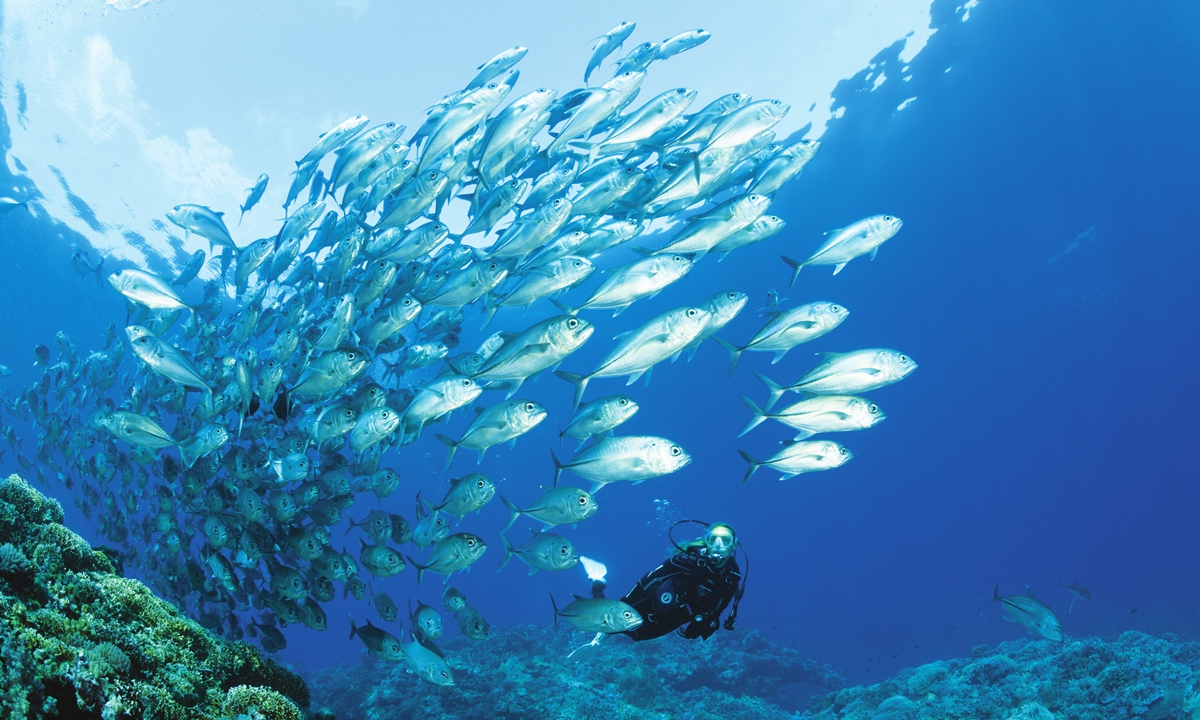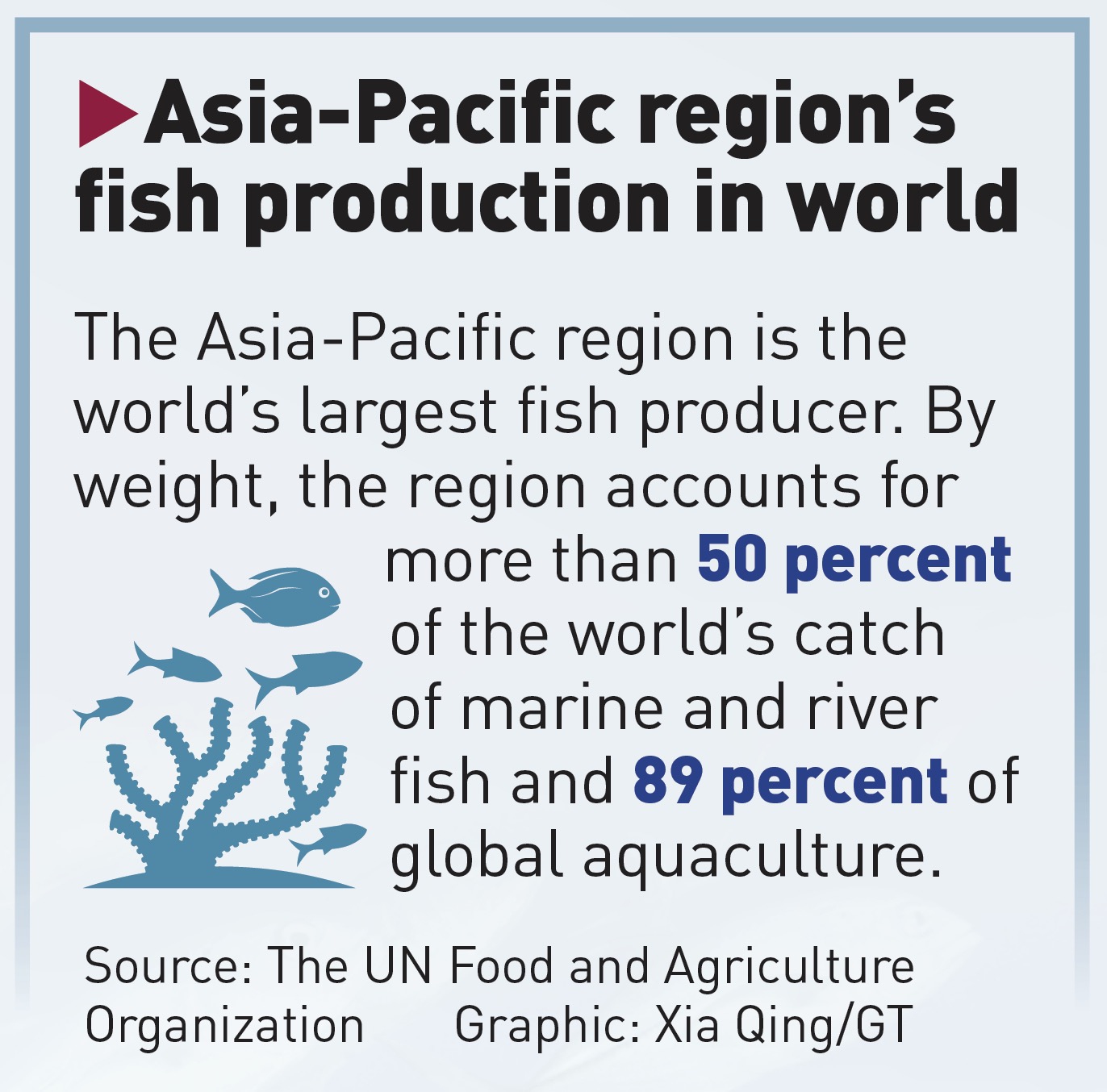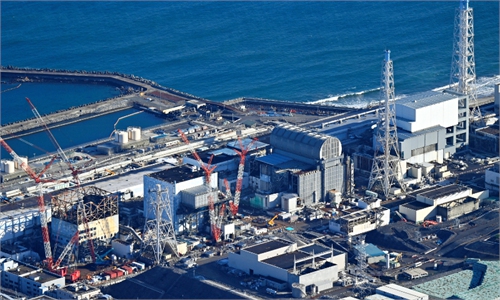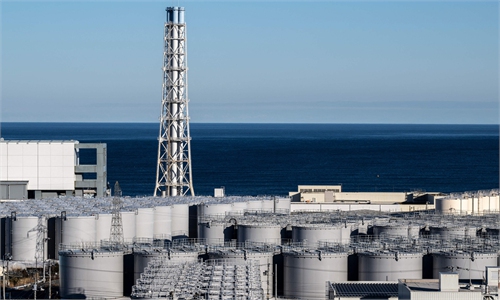World fishery groups sound alarm as Japan presses on with nuclear-contaminated wastewater dump, risking wide-ranging negative effects to marine life

A diver swims with a school of fish in the Solomon Islands. Photo: VCG
Editor's Note:
Days after the 12th anniversary of the Fukushima nuclear disaster, Japan began making preparations for the dumping of nuclear-contaminated wastewater from the Fukushima Daiichi nuclear power plant.
Despite strong internal and international opposition, Japan still intends to dump more than 1 million tons of irradiated water into the Pacific Ocean in the spring or summer of this year, the Japanese government confirmed in January.
This article features takes from fishery industry groups and individuals interviewed regarding Japan's decision to dump Fukushima's nuclear wastewater. It also looks into the potentially negative impacts this action could have on the fishing industry in the region and beyond from an economic and market perspective. This is the third of three installments by the Global Times.
Huang, a 58-year-old local fisherman in East China's Qingdao, Shandong Province, has been out in the sea fishing for most of his life. Most of his catch is from the East China Sea before it is served on the dinner tables of local and international consumers. Huang, who initially expected to continue his fishing career for at least another decade, may have to change such plans due to the current situation, forcing industry players like Huang to abandon their lifelong careers.
Over 1.3 million tons of nuclear-contaminated wastewater was generated by the Fukushima nuclear accident, with an additional 100 tons produced every day. The contaminated water is presently being stored in over 1,000 temporary tanks, and plans are underway to discharge it into the ocean over a 30-year timeframe.
According to research conducted by a German marine research institution, the radioactive materials from the contaminated water will spread to the majority of the Pacific Ocean within 57 days of being discharged, and will continue to travel to waters across the world over the next decade, painting a grim picture of the move's cross-border impact on the marine environment and public health.
The impact has sounded the alarm on potential economic losses to local fishing communities due to a decline in consumer confidence and demand for seafood from the affected areas, several industry insiders told the Global Times.
While it is unclear exactly how much harm will result from the release of contaminated water, dumping of such magnitude is enough to spark concern and anger due to the irreversible damage to the ocean that such a move might cause, with marine life being among the first and most heavily affected by such damage, industry insiders and experts said, urging the Japanese government to reconsider its very irresponsible dumping plan.
Industry alarm
Huang has spent most of his time fishing in the Yellow Sea and parts of the East China Sea, and when the news about Japan's nuclear wastewater dumping broke, it hit too close for him and others in the fishing business.
"We are deeply concerned about the nuclear wastewater dump, not only because of its possible harm to our health, but also how it might threaten regional maritime resources, on which we are heavily dependent for our livelihood," Huang told the Global Times.
Huang's concern is shared by other industry insiders including Sun Yanfa, a shellfish and seaweed farmer, who is also the deputy director at the Changhai Chamber of Commerce in Dalian, Northeast China's Liaoning Province.
Sun has been in the fishery industry for more than three decades, with his products increasingly gaining popularity not only in the Chinese market but also overseas, with the US and Japan being two major export markets.
But with growing consumer concerns linked to the intended dumping, Sun said that many ordinary people will resist consuming seafood not only from Japan but possibly from other regions as the impact spreads even wider.
Given the foreseeable damages to the local fishing industry, Sun insisted that "should there be any impact from the nuclear wastewater dump by the Japanese government, we should ask for compensation for the resultant losses."
Chi Feiyue, deputy secretary-general of the China Fisheries Association told the Global Times that geographically speaking, adjacent waters such as the Yellow Sea region and the entire East China Sea, which is abundant in various marine products and is a primary production area for hairtail and ribbonfish, would bear the brunt.
For example, the Yellow Sea region, including the Liaodong Peninsula and the Shandong Peninsula, is the main breeding ground for shellfish, oysters, sea cucumbers, algae, and seaweed. Among them, scallop farming accounts for 90 percent of China's total output while wakame, a kind of seaweed, makes up 80 percent.
"We resolutely oppose Japan's discharge of nuclear wastewater, since if it had an impact, it would be devastating," Chi noted.
In addition to ocean currents, fish has a process of backflow, which itself also increases the risk of radiation contamination, Chi said.
Chi said that in order to reduce the impact on fisheries, China spends hundreds of millions of dollars annually to release fry, making a great contribution to the sustainability of offshore fishing. China also implements fishing moratoriums to maintain marine life population numbers.
"But if Japan's nuclear wastewater is discharged, these efforts would all be for nothing," Chi said.
International responses
International industry players in other countries including South Korea and Japan also shared the concerns as the dumping could potentially threaten wider regions.
An employee at a Shanghai branch office of South Korea's National Federation of Fisheries Cooperatives told the Global Times that they are strongly opposed to Japan's nuclear wastewater dump and the company is very concerned that this action could affect marine products.
More than half of the South Korean industry's member companies are involved in the offshore fish farming and fishing business, according to the anonymous source, noting that industry participants including such major players will be affected if the dump takes place.
"Many consumers may not want to try seafood anymore, which will hit the fishing industry hard," he said.
The Hokkaido fishing grounds, which are situated in the southeastern waters of Hokkaido and are considered to be the heart of the North Pacific Ocean's fishing grounds, would be one of the first to suffer the consequences of a nuclear wastewater dump in the area, industry insiders said.
The region is the biggest fishing ground globally, and it is known for its abundant variety of fish, including salmon, pollock, saury, Pacific herring, and the Far East sardine.
On April 13, 2021, Japan unilaterally decided to discharge the nuclear-contaminated water into the ocean after treatment despite strong opposition. The fallout from this unilateral decision has since dented the local fishery industry in Japan.
Toshimitsu Konno, head of Fukushima prefecture's Soma Futaba Fisheries Cooperative Association, told Xinhua News Agency in March, "we are dead against the [new] release."
According to Konno, catches in the area are now equivalent to only 20 percent of the volume prior to the 2011 earthquake, although fish prices have recovered 70 to 80 percent of the pre-earthquake level. Dumping the contaminated water would further harm the reputation of local marine products.
"Once the contaminated water is discharged, our decade-long efforts have to start all over again," he said.
The fishing industry in nearby Pacific island countries (PIC) will also be hurt right along with the global fish consumption market.
For example, statistical data shows that the western Pacific region is the world's largest tuna fishing area, accounting for around 70 percent of the world's total production from four major tuna fisheries, according to media reports.
In response to Japan's dumping plan, in January, PIC called on Japan to postpone the discharge of nuclear-contaminated wastewater from Fukushima over concerns about the potential impact on marine life.
A regional group of 17 PIC argues that releasing nuclear-contaminated water into the sea could have a major impact on the fishing grounds that the island nations' economies depend on, according to media reports.
"There is no doubt in my mind that more time is absolutely necessary to fully consider all the implications of such a decision before choosing a course of action that is not only in the best interests of Japan but of all PIC," Henry Puna, Pacific Islands Forum Secretary General, said.

Graphic: Xia Qing/GT


